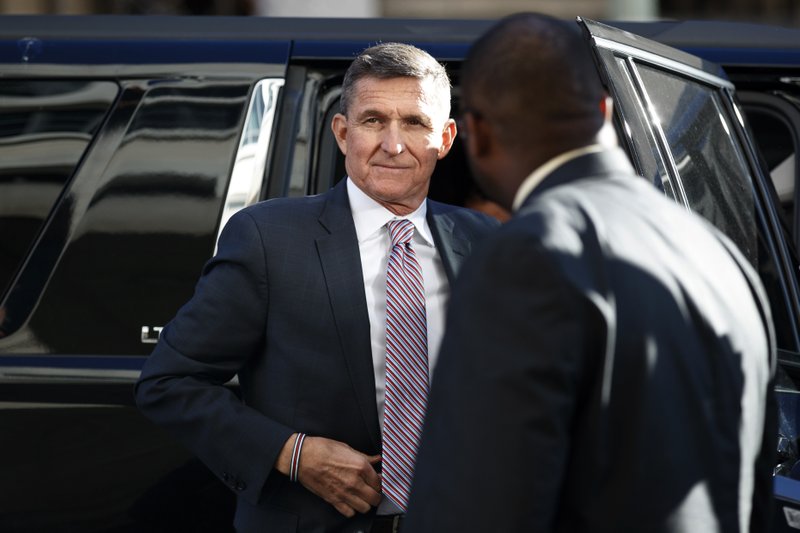The entire Washington-based federal appeals court is stepping into the legal dispute over former Trump national security adviser Michael Flynn as it weighs whether a judge can be forced to dismiss a case that the Justice Department no longer wants to pursue.
The action Thursday by the full U.S. Court of Appeals for the District of Columbia Circuit vacates a decision from a three-judge panel last month that ordered the case dropped. The move also prolongs the fight over Flynn’s fate and represents one more dramatic development in a case that has taken unexpected twists and turns over the past year and turned Flynn into something of a cause celebre for Trump and his supporters.
The court set arguments for Aug. 11. It did not offer an explanation for its decision in a brief order posted online, but did say “the parties should be prepared to address whether there are ‘no other adequate means to attain the relief’ desired.”
Sidney Powell, a lawyer for Flynn, did not immediately return an email seeking comment, but tweeted the news and wrote, “WOW!” A Justice Department spokeswoman declined to comment.
A three-judge panel ruled 2-1 last month that U.S. District Judge Emmet Sullivan had overstepped his bounds by not immediately granting the Justice Department’s request in May to dismiss the case against Flynn, who pleaded guilty to lying to the FBI about his contacts with the Russian ambassador during the presidential transition period.
The panel ordered Sullivan to grant the department’s motion and to dismiss the case, but Sullivan asked for the dispute to be reviewed by the full court instead of just three judges.
The unusual dismissal motion by the Justice Department, in one of the signature prosecutions of special counsel Robert Mueller’s investigation into Russian election interference, followed a review by a U.S. attorney who was assigned by Attorney General William Barr to scrutinize the Flynn case. That prosecutor, Jeff Jensen of Missouri, recommended that the department dismiss the case.
In its motion, the department said it had determined that the FBI had insufficient grounds to question Flynn about his contacts with the diplomat, Sergey Kislyak, and that any statements Flynn made during the interview were not material to the broader counterintelligence investigation into ties between Russia and the Trump campaign.
The FBI was alarmed by the December 2016 conversations because, on the calls, Flynn had encouraged Kislyak to refrain from escalating tensions over sanctions imposed by the Obama administration for Moscow’s interference in the election that Trump had just won against Democrat Hillary Clinton. White House officials, meanwhile, had adamantly denied that Flynn and Kislyak had discussed sanctions.
Sullivan was prepared to sentence Flynn in December 2018, but after upbraiding him at the sentencing hearing, he agreed to postpone the proceedings so that Flynn could continue cooperating in hopes of receiving a more lenient punishment. Flynn subsequently replaced his lawyers with a new trial team that has taken a far more adversarial approach toward the case, and he moved earlier this year to withdraw the guilty plea.
He was still awaiting sentencing at the time the department sought to dismiss the case.
Rather than immediately dismiss the case, Sullivan appointed a retired federal judge to argue against the Justice Department’s position and to consider whether Flynn could be held in criminal contempt for perjury because he had previously pleaded guilty.
Flynn’s lawyers asked the appeals court to step in and order Sullivan to grant the department’s request.
(AP)












One Response
> The FBI was alarmed by the December 2016 conversations because, on the calls, Flynn had encouraged Kislyak to refrain from escalating tensions over sanctions imposed by the Obama administration for Moscow’s interference in the election that Trump had just won against Democrat Hillary Clinton. White House officials, meanwhile, had adamantly denied that Flynn and Kislyak had discussed sanctions.
The FBi was alarmed that the President-elect was following age-old US precedent of “smooth transition of power” by actually familiarizing themselves to their foreign counterparts? U.S. President-elects have always done that to facilitate “smooth transition of power”, except, it seems, when Clinton lost and Obama’s lame-duck government was out to trash the age-long US tradition of “smooth transition of power”.
But aside from that, what is there to be alarmed about asking Russia to refrain from escalating tensions? Did Obama want Russia to escalate tensions?
And further, asking Russia to refrain from escalating tensions is not itself a discussion on anything – it is simply a request from one person to another – that is, don’t make our future negotiations more difficult by reacting to Obama’s provocations.